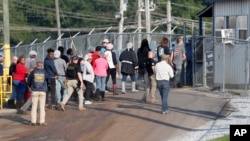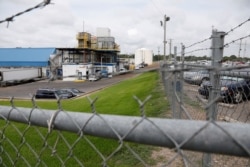Hundreds of immigrant workers detained in Mississippi were released Thursday, a day after federal agents arrested 680 undocumented migrants in raids on food-processing plants, the largest such operation in the United States in 10 years.
At a news conference, officials from U.S. Immigration and Customs Enforcement’s Homeland Security Investigations and the U.S. Attorney’s Office for the Southern District of Mississippi said more than 300 people, including pregnant women and juveniles, had been released on humanitarian grounds.
Those released on their own recognizance were served with notices and at some point will have to appear before immigration judges. Others were transported to detention facilities in Louisiana and Mississippi.
Nearly all of the 680 migrants picked up were from Latin America.
According to officials, the operation, which had been in the planning stage for about a year, was executed when a judge agreed that law enforcement officers had “sufficient probable cause" to get search warrants and execute them.
Expedited guidelines
Immigration officials said no one arrested was processed under new expedited removal guidelines that ICE issued in July, because agents are “still in the process of doing the training.”
The new interpretation of the expedited removal guidelines accelerates the deportation of undocumented immigrants anywhere in the United States who are not able to prove they have been in the country continuously for two years. The potential result is deportation before the undocumented immigrant is given a chance to see an immigration judge.
Federal officials said those detained Wednesday were asked if they had children at school or at child care who needed to be picked up. Detainees were offered cellphones so they could make the necessary arrangements for their children.
ICE agents said migrants were initially taken to a military base for processing. Some were given electronic ankle monitors to wear as they wait for court dates.
About 600 ICE agents were involved in the operation. They raided chicken- processing plants owned by five different companies in Bay Springs, Canton, Carthage, Morton, Pelahatchie and Sebastopol, all in Mississippi.
Companies quiet
None of the food companies involved in Wednesday’s raids have yet commented.
Many migrants, including those found to be in illegal status, are hired by companies of all sizes because they are considered willing to take jobs many U.S. workers do not want. Immigration advocates say such employment is essential for the economy.
U.S. Attorney Mike Hurst told reporters that those who want to come to the United States “have to follow our laws. ... They have to come here legally, or they shouldn’t come here at all.”
Hurst also had a strong message for companies that he says knowingly hire undocumented immigrants “for competitive advantage or to make a quick buck.”
“If we find that you have violated federal criminal law, we’re coming after you,” he said.
Immigrant advocates
Also Thursday, immigration advocates were joined by pastors and civil rights attorneys calling for an end to ICE raids like the one in Mississippi.
Luis Espinoza, an organizer with Mississippi Immigrant Rights Alliance, said those affected need legal assistance. An emotional Espinoza, who has been visiting the communities where people have been detained, urged people to help.
“I don’t see illegals. I don’t see bad people. It is only families — fathers, mothers who want something better for their kids. So, they come here and just work. They are not criminals,” he said.
The American Civil Liberties Union of Mississippi, the Mississippi Center for Justice and a coalition of groups across the state have come together to help those in detention. Attorneys are monitoring the situation and exploring options to assist those affected by the raids.
Cliff Johnson, director of the MacArthur Justice Center, said what happened Wednesday was not the response of Mississippians.
“This doesn’t come from the people. It doesn’t even come from those people who on the larger scale might chant, ‘Build that wall.’ Because in Mississippi, we know each other. … We’ve got our problems. We’re a hot mess at times, but this is not our choice,” he said.



